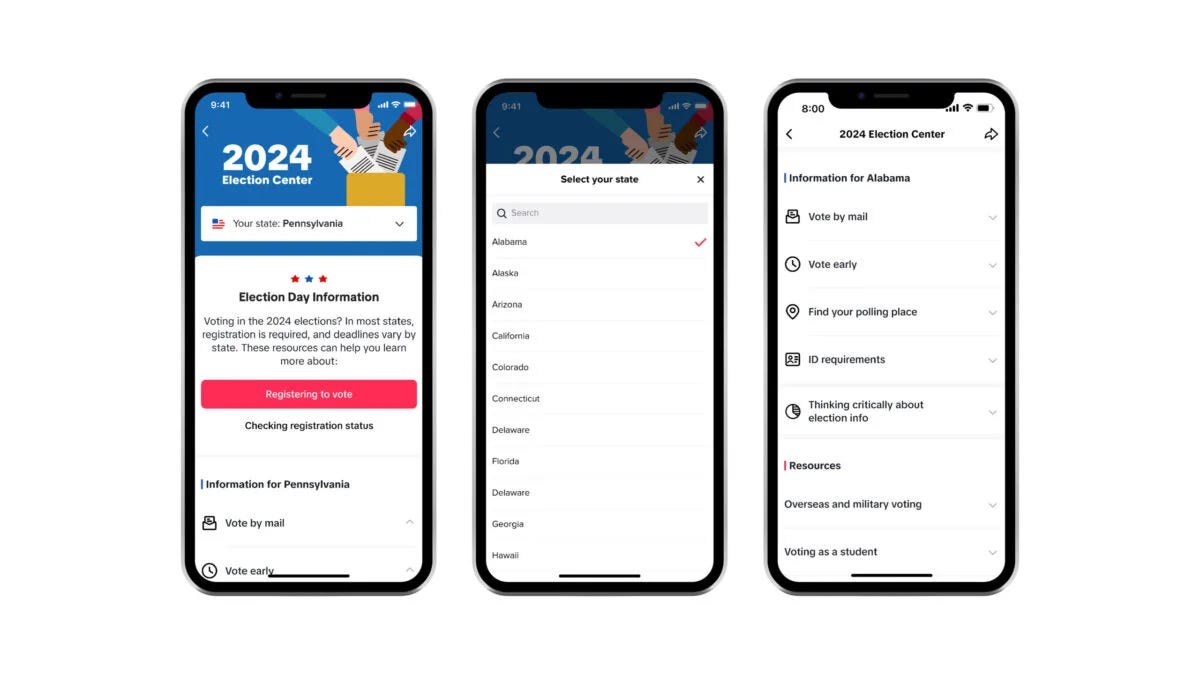Hello,
you are reading Understanding TikTok. My name is Marcus. I am reading about Instagrammability by Kyle Chayka, AI art as the new stock image by Oliver Reichenstein and sending out this newsletter to you. Today we talk about:
🧃 The Hot Houthi
🔭 TikTok as a search engine
🗳️ Election Integrity
🧃 The Hot Houthi
One week ago a user on X reposted a TikTok of a young man sailing around the Galaxy Leader, a cargo ship seized by Yemen’s militant Houthis last year. “Yemeni pirates posting casual tiktok’s while the entire western imperial core are having a meltdown about their blockade on their ships is the funniest shit of 2024, surely,” the user wrote in a caption. The video has been viewed more than 24 million times, with social media users dubbing the handsome man “Timhouthi Chalamet.” (Vice)

Since then Rashed Al-Haddad, 19, has been interviewed by Reutes (“They compared me to a Hollywood actor. I did not care. We need to focus on the Palestinian cause”) and HasanAbi – one of the most-viewed streamers on Twitch - where the Yemeni stopped short of confirming he was a member of the Houthi military (Forbes). Not everybody liked the interview.
Al-Haddad’s videos that have since then been removed from TikTok show an unusual perspective on a conflict that has drawn the US into military action (Insider) and have gained braod international media coverage with tabloids outbiding themselves (Daily “longing for martyrdom” Mail or The “Houthi Heartthrob” Sun).

Al-Haddad’s videos show the increasing mediatization of warfare and are part of a battle for public perception and imagery control. The notion of being “hot” refers to a tactic often referred to as 'thirst trap' propaganda. A thirst trap refers to a photo or video shared online intended to attract sexual attention and 'trap' engagement (Boffone, 2023) and has been utilized by militaries in the U.S., Israel, Spain, and North Korea (Walker, 2023).
Al-Haddad - even when not officially part of the Houthi military - applies this propaganda technique in an asymmetric warfare minimizing and trivializing the perception of violence (Kuntsman & Stein, 2020) and influences public perceptions of the 'image war' (Yarchi & Boxman-Shabtai, 2023).
🔭 TikTok as a search engine
Ever since July 2022, when a statistic from Google about Generation Z and their use of social platforms for search started making headlines, there have been reports that TikTok is the new Google. It is not, argues Rebecca Sentance in a new article (Econsultancy). Well, it is – concerning search and Gen Z and the topics being searched for – some studies say (Search Engine Land).

Let’s agree first that Google Search really has gotten worse (Mashable). Users are redefining their relationship with search engines, with TikTok emerging as an unexpected contender (Adobe). 64% (Adobe Study) to 74% (Her Campus Media) of Gen Z use TikTok for search. The reasons are pretty obvious: The video format of the results (69%), More relatable answers (65%), Personalized answers (47%). Recipes, music, DIY tips, fashion, and workout advice topped the list of queries (Insider). This has effects for brands, consumers, researchers and of course TikTok itself.
TikTok has quietly been inserting Wikipedia snippets into search results (The Verge) and has been testing a new feature that integrates Google Search into its own in-app search results (Techcrunch) in September 2023. And of course there are ads. TikTok has introduced the Search Ads Toggle, which will show your ads among the organic video search results for relevant queries (Search Engine Land). Let’s stretch out, wait and reassess in a couple of months. Search is changing fast these days. We probably need to know what AIO is soon.
🗳️ Election Integrity
What are TikTok’s plans to counter election misinformation this year? Answer: Pretty much the same as in 2022 (government technology): an in-app election guide, no paid political advertising (well) and co-operation with fact-checking organizations (well). This time TikTok has started earlier and wants to release detailed reports on covert influence campaigns that it uncovers. This is a good thing.

TikTok also requires all official government, politician, and political party accounts to be verified in the app (Social Media Today). Reinforcing trustworthiness. Good idea too. Will that all be enough? Probably not. We can expect foreign information manipulation and interference operations and attacks from inside. Several U.S. politicians have already employed misleading tactics, through the use of generative AI, including simulated visuals, video, and audio, in order to imply things that never happened, and smear opponents 🙃.
🗞️ What else
Jules Terpak – brilliant as always on TikTok Edits or how “you can convince people of anything if you put it in a TikTok with a catchy sound.”
TikTok Launches Auto Scrolling. Will It Replace Doomscrolling? (Forbes)
TikTok’s manosphere problem (Media Matters)
Parents worry AI-generated influencers… (NBC)
Workers are filming their layoffs. What could go wrong? (BBC)
Is TikTok really 'negatively impacting literature' (Yahoo)
TikTok can generate AI songs, but it probably shouldn’t (The Verge)
TikTok’s nine-month cruise (The Guardian)
The Corporate Accent (HuffPost)
Chad Facing (GQ)
Here's Why You're Seeing "Rio de Janeiro" (Distractify)
The TikTok Shop (Insider)
That’s it for now. Thanks for reading. As always. Please tell a friend or foe to subscribe or unsubscribe. Speak soon. Ciao.



